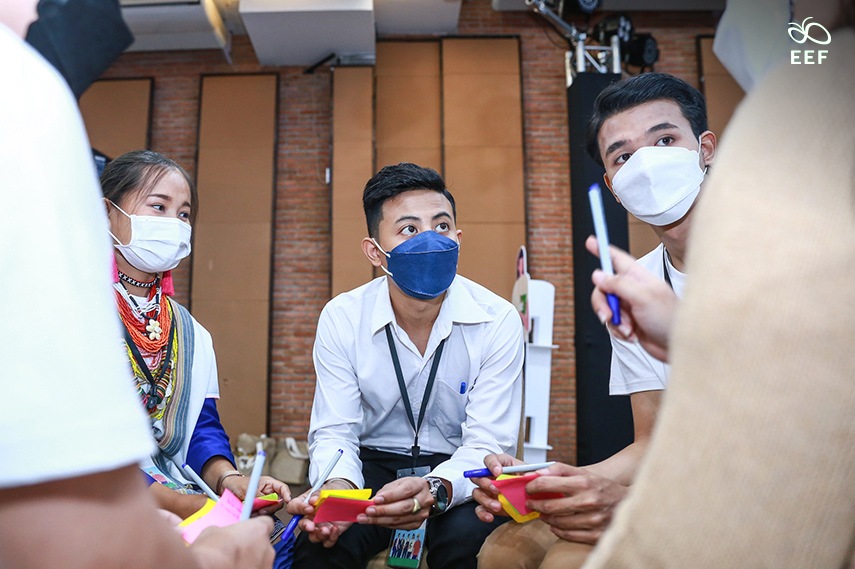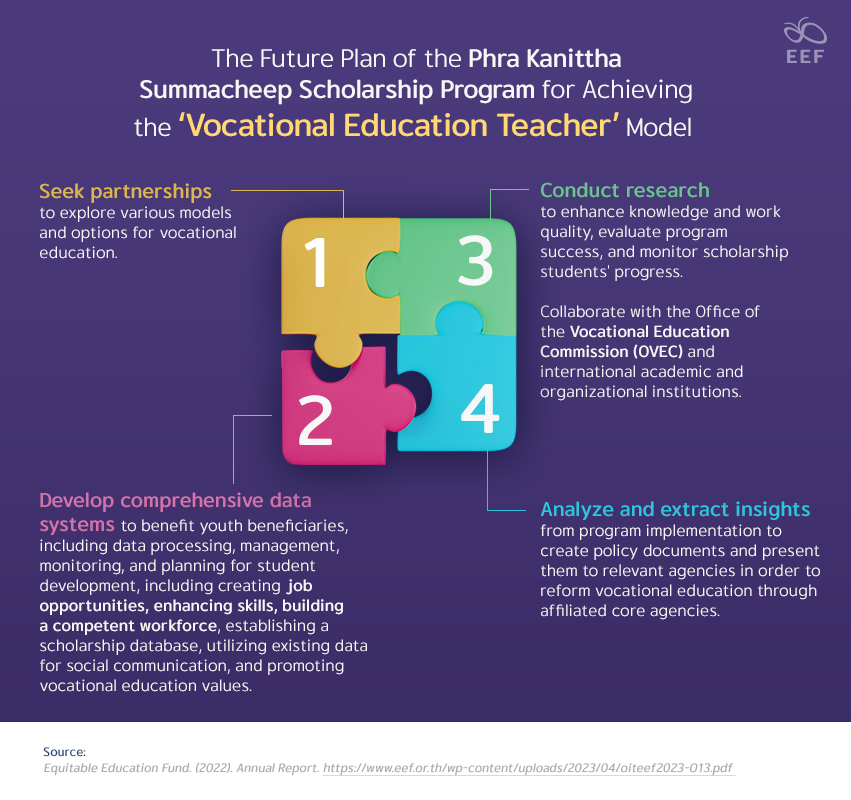
Many disadvantaged young people in the country lack access to higher education, particularly those from the bottom 15% income bracket. Despite facing financial challenges, these students, referred to as “Resilience Students,” demonstrate impressive academic performance and skills comparable to their more privileged peers. However, without adequate opportunities and financial support, they risk dropping out and entering low-skilled jobs, hindering their social mobility and causing a loss of valuable human resources.

To address this issue, Phra Kanittha Summacheep Scholarship has been implemented by the Equitable Education Fund (EEF) Thailand. This program aims to provide additional support to underprivileged vocational students who have shown potential academic performance at the national level. The scholarships enable these students to pursue higher education, ranging from bachelor’s to doctoral degrees. Each year, 40 students are selected through a rigorous process involving academic institutions, private sector representatives, and mass media. The goal is to develop competent and talented individuals who can serve as role models in vocational education, contributing to societal transformations and enhancing the quality of vocational personnel in alignment with the Thailand 4.0 strategy.
Furthermore, there is a focus on expanding the impact of developmental investments by aligning them with successful pilot projects. These projects lead to transformative changes in the operations of affiliated organizations and drive long-term systemic reforms. Underprivileged youth who lack financial resources or opportunities, but meet the eligibility criteria, can benefit from the Phra Kanittha Summacheep Scholarship in sectors related to the First S-curve, New S-curve, and STEM disciplines.

Phra Kanittha Summacheep Scholarship aims to provide financial support to vocational students aged 17-21 who have completed their vocational or higher vocational certificates. These students show exceptional potential but lack the financial means to pursue higher education. The scholarships allow them to further their education, thereby creating a skilled workforce that is crucial for Thailand’s economic growth. The program promotes a youth development model that nurtures exceptional individuals and emphasizes the value of vocational education, offering equal opportunities alongside traditional academic studies.
Over the past 4 years, the program has provided vocational career opportunities for underprivileged youth. A total of more than 120+ individuals have received scholarships through four rounds, leading to transformative changes in the vocational workforce. This achievement has been made possible through various measures, including infrastructure development, the establishment of a database, the implementation of an individual tracking system, and refined search and selection methods. Collaboration with the public and private sectors has facilitated the support and development of outstanding students. Future plans involve strengthening education and career paths in diverse fields of interest by integrating essential life skills, volunteering, teamwork, and basic financial knowledge. This initiative aims to empower scholarship recipients to learn, grow, and become valuable contributors to the country’s progress.
Moreover, a database and advisory system have been developed for students in academic, vocational, and life domains. This system facilitates their pursuit of higher education or entry into professional fields. Additionally, internship opportunities aligned with their areas of study enable students to gain valuable experiences and knowledge from the private sector and entrepreneurs, ultimately benefiting communities and society at large.

Moving forward, the Phra Kanittha Summacheep Scholarship aims to improve vocational education by developing the “Vocational Education Teacher” model in collaboration with the Office of the Vocational Education Commission (OVEC). To achieve this, the program will seek partnerships to explore various models and options for vocational education. It will also develop comprehensive data systems to benefit scholarship recipients, including data processing, management, monitoring, and planning for student development. The program will conduct research to enhance knowledge and work quality, evaluate program success, monitor students’ progress, and collaborate with OVEC and international academic and organizational institutions. The program will also analyze and extract insights from program implementation to create policy documents and present them to relevant agencies, with the aim of reforming vocational education through affiliated core agencies.

The accomplishments of the Phra Kanittha Summacheep Scholarship Program highlight its positive impact on disadvantaged students. The program has created educational opportunities that promote socioeconomic advancement and benefit both individuals and their families. It has opened up new pathways for vocational students, enabling them to pursue higher education and expand their career options. The collaboration and support from various organizations have been instrumental in enhancing the potential of vocational students, leading to a structural transformation in the development of skilled personnel. This, in turn, contributes to the overall improvement of businesses and strengthens the country’s economy.

The Future Plan of the Phra Kanittha Summacheep Scholarship Program
for Achieving the “Vocational Education Teacher” Model
- Seek partnerships to explore various models and options for vocational education.
- Develop comprehensive data systems to benefit youth beneficiaries, including data processing, management, monitoring, and planning for student development, including creating job opportunities, enhancing skills, building a competent workforce, establishing a scholarship database, utilizing existing data for social communication, and promoting vocational education values.
- Conduct research to enhance knowledge and work quality, evaluate program success, and monitor scholarship students’ progress. Collaborate with the Office of the Vocational Education Commission (OVEC) and international academic and organizational institutions.
- Analyze and extract insights from program implementation to create policy documents and present them to relevant agencies in order to reform vocational education through affiliated core agencies.
Source: Equitable Education Fund. (2022). Annual Report.
https://www.eef.or.th/wp-content/uploads/2023/04/oiteef2023-O13.pdf

